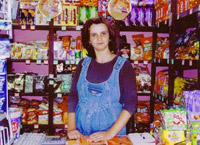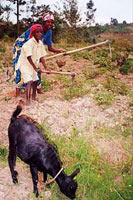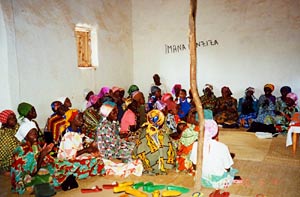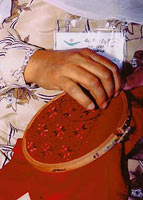Women survivors of recent conflicts

Bosnian woman in her market garden
The photographs on this page illustrate the support and education provided to women through Project Independence: Women Survivors of War, a partnership between Soroptimist International and Women for Women International (2003-2007)
The war with Yugoslavia in 1992 and subsequent conflicts between Bosnian Serbs, Croatians and Bosniaks (Bosnian Muslims) was conducted through a deliberate policy of 'ethnic cleansing'. Mass rape, women's concentration camps, forced impregnation, forced prostitution and sexual slavery were used as systematic weapons of war.
The Dayton Accord, signed in 1995, has been heavily criticised for not involving any Bosnian women in the process and taking little account of the specific needs of women and children. Over 20,000 women were raped and a large proportion of women left widows in a patriarchal culture that makes no provision for unmarried women.
Women for Women International is providing training in traditional and new skills, and offering financial assistance for women to establish small businesses. This will enable women to support themselves and their families in a country where unemployment is over 40% and the national economy is recovering only very slowly.

Examples of knitwear

Bosnian woman in her shop funded by Project Independence
It is estimated that 500,000 women and girls - some as young as 5 years old - were systematically tortured, physically abused and raped during the 1994 conflict in Rwanda.
They suffered both physically - many were left pregnant and infected with AIDS - as well as emotionally and mentally.
Women for Women International are working in Rwanda to rebuild lives torn apart by the war by offering training, financial support and counselling. This will enable individual women to learn skills and set themselves up with small businesses allowing them to be independent and self-reliant.
As well as vocational training Women for Women International also offer citizen's awareness classes to encourage women to take a greater part in local and national politics. In Rwanda 49% of the members of parliament are now women - only Sweden has a higher proportion.

Working on the land to provide food for the family

Rights-awareness training in Rwanda
The Soviet invasion of Afghanistan in 1979 led in 1984 to United States support of local militiamen fighting the invaders and to Osama bin Laden opening a base in Peshawar in 1989 to assist in the fight against the Soviets.
Factional fighting and chaos followed the withdrawal of the USSR in 1989 and the extremist Taliban finally took control in 1996 with financial support from Osama bin Laden.
The invasion of Afghanistan following 9/11 2001 removed the Taliban and has eased some of their repressive laws against women. However, it has not led to such a great improvement, particularly in the insecure rural areas where forced marriages, violence, poverty and exclusion from schooling are still the everyday reality for many Afghanistan women.
65% of IDPs (Internally Displaced Persons) and refugees are women and children - over 4.8 million in total. 50,000 women were widowed during the civil wars and many have had to resort to begging as they are still denied employment opportunities.
Women for Women International is working with groups of women to offer training and financial assistance for women to acquire the skills and confidence needed to set up businesses for themselves.

Woman making embroidered goods

Good quality footwear has proved a particularly successful product
Next: Back to all online exhibitions